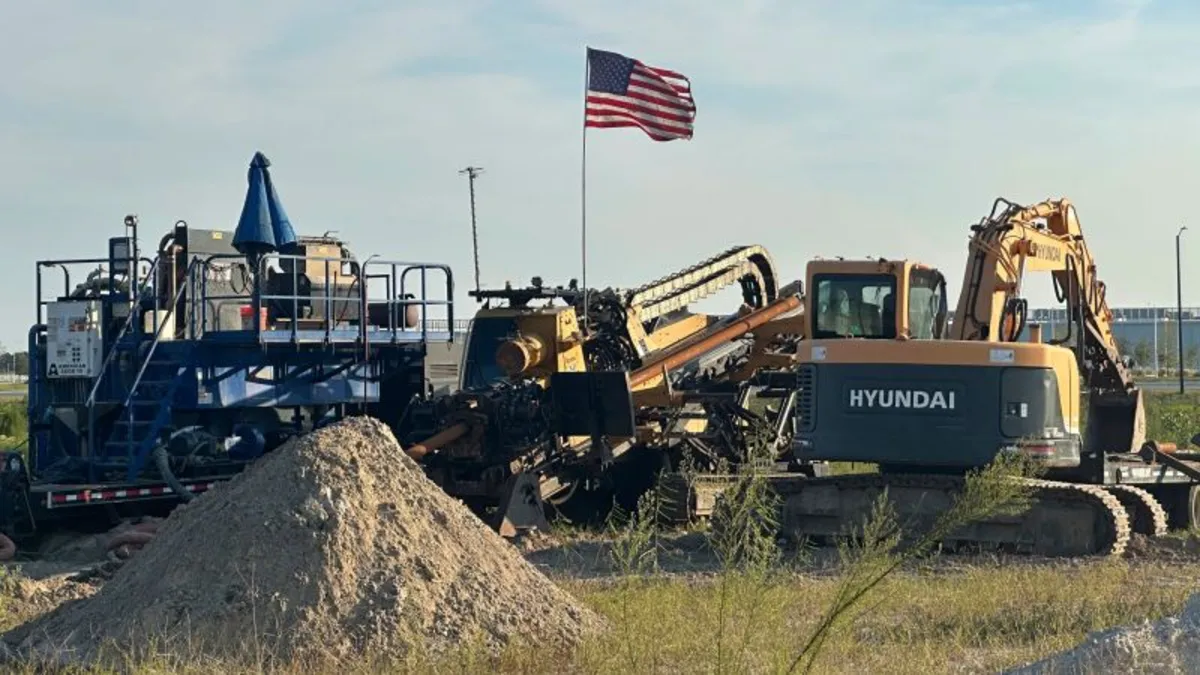
A sprawling Hyundai manufacturing plant in a quiet southeast Georgia community became the focal point of one of the most significant immigration raids in recent US history on Thursday. The operation, which had been months in the planning, culminated in a staggering 475 arrests, predominantly involving Korean nationals. As state troopers cordoned off roads leading to the facility, nearly 500 federal, state, and local officers entered the still-under-construction battery production site.
As agents swiftly moved through the expansive grounds, they lined up workers against the walls. The news of the raid spread rapidly, prompting a chaotic response from the workers, some of whom attempted to escape by running towards a sewage pond, while others sought refuge in air ducts. Federal officers engaged with each individual, assessing their legal status in the US. Those who were cleared were allowed to leave, while the remaining individuals were taken into custody and transported to the Folkston ICE Processing Center, as confirmed by officials. By 8 p.m., the operation concluded, marking a pivotal moment in the current administration's immigration enforcement efforts.
Describing the scene as a “war zone,” a construction worker at the Hyundai plant recounted the chaos that unfolded on Thursday morning. The worker, who chose to remain anonymous for privacy reasons, was among the first detained. “They instructed everyone to line up against the wall. We waited there for about an hour before being moved to another area for processing,” he shared. Masked and armed agents commanded the workers, who were clad in hard hats and safety vests, to line up while the raid continued. Officers requested each worker’s Social Security number, date of birth, and other identifying information.
Workers who were validated as legal were issued a document stating they were “clear to depart,” which they needed to present at the gate when leaving the plant. Another worker revealed to a CNN affiliate that he managed to evade capture by hiding in an air duct. “We heard everyone yelling that immigration had arrived, so we hid ourselves in an air duct, which was extremely hot,” he recounted. The chaotic environment resulted in several workers attempting to flee, with some even jumping into a sewage pond located on the premises, as reported by the US Attorney’s Office for the Southern District of Georgia.
According to Steven Schrank, a special agent from Homeland Security Investigations, all 475 individuals taken into custody were found to be illegally residing in the US. This includes those who had crossed the border unlawfully, others with visa waivers prohibited from working, and individuals who had overstayed their visas. The majority of those detained were identified as Korean nationals, although a detailed breakdown of nationalities was not provided. Schrank mentioned that some workers may have been contractors or subcontractors.
A spokesperson for Hyundai stated that no direct employees of the company were believed to be among those arrested. “We are reviewing our processes to ensure that all parties working on our projects adhere to the high standards of legal compliance that we expect,” the spokesperson added. Hyundai emphasized its zero tolerance policy for any violations of the law.
In the United States, being undocumented—whether through unauthorized border crossing or visa overstays—is typically treated as a civil violation rather than a criminal act. Employers nationwide utilize the federal E-Verify system, established over two decades ago, to verify the legal employment eligibility of new hires. Nevertheless, the Trump administration had criticized this system as unreliable without proposing a viable alternative.
In response to the raid, the South Korean government announced it would send diplomats to the site and reached out to the US embassy in Seoul to urge caution regarding the rights of Korean citizens. Georgia immigration attorney Charles Kuck shared that two of his clients, who arrived from South Korea under a visa waiver program, were detained during the raid. “They were authorized to work in the US under a visa waiver,” Kuck explained, noting that both clients were engineers there to provide brief support before returning to South Korea.
This extensive operation was the result of months of coordinated planning by various federal agencies, including ICE and Homeland Security Investigations, alongside the Georgia Department of Public Safety, the Department of Labor’s Office of Inspector General, the FBI, and others. “This was not a standard immigration operation,” Schrank clarified at a news conference. “It involved a lengthy investigation that gathered evidence and conducted interviews, culminating in the execution of a search warrant.” The operation aimed to address allegations of illegal employment practices and other serious federal crimes.
The raid interrupted the construction of the EV battery plant at the Hyundai Metaplant, which spans an impressive 2,900 acres and is projected to create up to 8,500 jobs upon completion. Georgia Governor Brian Kemp's office responded to the raid, asserting, “In Georgia, we will always enforce the law, including all state and federal immigration laws.” This event marks a significant chapter in the ongoing dialogue surrounding immigration enforcement and labor practices in the United States.